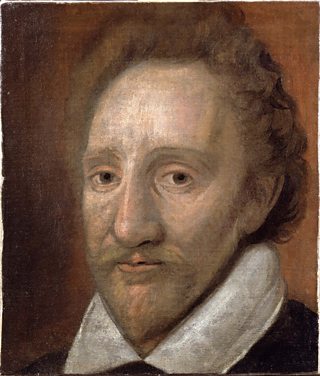Shakespeare is dead, but his players tour Lancashire
After Shakespeare’s death in 1616 his prestigious company of actors the King’s Men toured to the north-west a number of times.
A frequent stop on their route through Lancashire was made at Dunkenhalgh Hall, a private residence a few miles south of the Ribble Valley along the River Calder, not far from Blackburn.
-
![]()
Much ado near me
Hear more Shakespeare stories on BBC Radio Lancashire
-
![]()
Shakespeare Festival 2016
The BBC celebrates the genius of the bard

In 1571 the property had been sold to Thomas Walmesley (knighted by James I in 1603), a lawyer who enlarged the estate. Thomas Walmesley (1574-1642), the son of Sir Thomas, was resident at the time of the King’s Men’s visits.
Family household accounts survive for 1612-54 so we know that Thomas Walmesley hosted performances by the King’s Men in his hall in the following years, usually rewarding them generously with 20 shillings: 25 July and 18 December 1620; the week of 15-21 October and 16 December 1624; and 11 December 1628.
The Walmesley family were so-called ‘recusants’ - members of the local gentry with Catholic sympathies - and their appetite for entertainment was evidently keener than that of their protestant neighbours, the Shuttleworths of Gawthorpe, who are known to have hosted noticeably fewer players, musicians, fiddlers and waits during the same period.
Apparently they were a popular feature of the pre-Christmas festivities for this hospitable member of the Lancashire gentry. During a 26-year period, Walmesley hosted 59 visits by troupes of players, so the King’s Men were following a well-frequented road.
Although the records do not show what the King’s Men performed in Lancashire, by then they would have had at their disposal Shakespeare’s canon of works of course.
Just who were the King's Men?
The King’s Men were the acting company in which Shakespeare was a member for most of his writing and acting career.

Burbage never retired from the stage and continued acting until his death in March 1619, a year before they came to play at Dunkenhalgh Hall.
They were known as the Lord Chamberlain’s Men during the reign of Elizabeth I and become the King’s Men by the royal decree of King James I when he came to power in 1603. In the royal patent of 1603, the King’s Men were named as – Lawrence Fletcher, William Shakespeare, Richard Burbage, Augustine Phillips, John Heminges, Henry Condell, William Sly, Robert Armin, Richard Cowley…”and the rest of their associates…”.
By the time of the troupe’s visit to Lancashire in 1620, we know that several of the actors named in the patent had already died. The most recent would have been lead actor Richard Burbage, who played Shakespeare’s demanding male parts – Richard III, Othello, King Lear, Antony and Macbeth. Burbage never retired from the stage and continued acting until his death in March 1619, a year before they came to play at Dunkenhalgh Hall.
In 1800 most of the house was pulled down and rebuilt in the Gothic style. 'The plan [of the current 19th c. building] probably follows more or less that of the original house, which seems to have been of the usual type of central hall and projecting wings.... The building is of two stories, its principal front facing north...' (VCH Lanc 6.422). Dunkenhalgh Hall has now been converted as a hotel and spa.
Shakespeare on Tour
From the moment they were written through to the present day, Shakespeare’s plays have continued to enthral and inspire audiences. They’ve been performed in venues big and small – including inns, private houses and emerging provincial theatres.

BBC English Regions is building a digital picture which tracks some of the many iconic moments across the country as we follow the ‘explosion’ in the performance of The Bard’s plays, from his own lifetime to recent times.
Drawing on fascinating new research from Records of Early English Drama (REED), plus the British Library's extensive collection of playbills, as well as expertise from De Montfort University and the Arts and Humanities Research Council, Shakespeare on Tour is a unique timeline of iconic moments of those performances, starting with his own troupe of actors, to highlights from more recent times. Listen out for stories on Shakespeare’s legacy on your BBC Local Radio station from Monday 21 March, 2016.
You never know - you might find evidence of Shakespeare’s footsteps close to home…
Craig Henderson, BBC English Regions
Shakespeare...on a Sunday?!
By Sally-Beth MacLean, REED General Editor
On 11 May 1632, a local alehouse keeper was hauled into the county quarter sessions court in Warrington for allowing the performance of a play during the hour of divine service on the previous Sunday.
He professed no inkling as to why the group of nine young men wanted to use his loft though he had heard later that they were performing a play.
The miscreants were also examined and named the play – the title given was ‘Henry VIII’ so we are tempted to ask whether they might have gotten their hands on a version of Shakespeare’s play (in likely collaboration with the Jacobean playwright John Fletcher), first published in the First Folio edition of 1623, but reissued in 1632. Henry VIII had been revived at court in 1628.
Related Links
Shakespeare on Tour: Around Lancaster
-
![]()
Lancashire family prove pivotal to Shakespeare's players
The Stanley’s were enthusiastic sponsors of Elizabethan entertainers
-
![]()
Lancaster Theatre sparkles with Shakespearean talent
The Grand Theatre in Lancaster, which was once managed by Stephen Kemble
Shakespeare on Tour: Around the country
-
![]()
The 1809 ticket price riots
The most famous riots in the history of theatre
-
![]()
Cambridge students put on a Christmas satire
Shakespearean style 'Footlights'
-
![]()
North West's influence on Shakespeare's success
Plus, the small Cheshire town that attracted Shakespeare's players
-
![]()
Salisbury shadows play Shakespeare
A dreamy performance of Shakespeare








